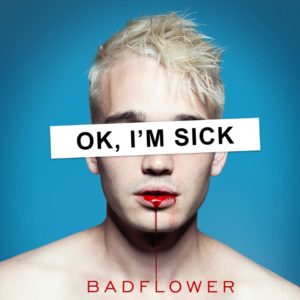When you think about it, historically, music has always had a societal function other than being mere entertainment: troubadours of the middle ages sang songs to tell stories, spread news, and pass down lore, spirituals were sung by African American slaves to reinforce Christian values and vocalize the hardships of slavery, and the 1960s were ripe with protest songs about war and injustice. With the release of their debut full-length album, OK, I’m Sick (out 2/22 via Big Machine/John Varvatos Records), Los Angeles hard rockers Badflower will add their collective voice to the tradition of socially present rock.

Photo Credit: Tyler Shields
“I’m not a doctor or a scientist, this is just me sitting on Google in the middle of the night trying to figure this shit out.”
Those words from Badflower frontman, Josh Katz, during our conversation are wholly unsurprising: he has always been an unusually thoughtful and responsive person to interview. And that answer is as honest as they come and came at the end of a heady rush of thought as to why he believes so many – himself, included – seem to suffer from mental health issues like panic disorder, depression, and anxiety today as opposed to, say, 200 years ago. Is it that we are centuries removed from a less stressing, simpler existence or were the issues always present, but just not acknowledged or discussed?
Katz’s theory circles around the fact that we – society – have reached a level of comfort in our daily lives that past generations never had. He explains that, while we may love the comfort, the brain’s primal instincts may have yet to fully adapt.
“I wake up every morning and I have no threat of death, you know what I mean? I wake up in a home and – even people who are living not the best – don’t have the threat of a wild animal coming and chasing you and killing you, we don’t have the threat of the plague knocking you out.
But it’s like our brains haven’t really caught up to our [comfortable] lifestyle and so we haven’t quite evolved into this lifestyle that we have which is safe. And now we have all of these…unnecessary triggers that will trigger our brains into thinking that we’re in serious danger when we don’t really have a lot of danger, serious danger in our lives. I think these functions in our brain just had a purpose 200, 300, 400 years ago and they don’t have as much of a purpose now so they’re just running rampant.”
That’s deep shit. The kind of deep that keeps Katz engaged on search engines and writing intimately confessional lyrics that expose his strengths and frailties to anyone who cares to listen to what he and bandmates Joey Morrow (guitar), Alex Espiritu (bass) and Anthony Sonetti (drums) have to say. Songs like “Ghost” – the lead single from OK, I’m Sick with its vivid narrative of suicide and depression and remorse – show that there doesn’t seem to be any subject that Badflower is afraid to tackle.
At 13 songs long, OK, I’m Sick is an intensely emotional and jarring journey of riff-filled, primal hard rock and a blatantly 21stcentury rock record covering a range of topics more modern than the average top 40 charts can handle and doing so with an unnerving honesty and vulnerability. In the case of their single and musical theater video, “x A N A x,” a healthy dose of cheeky humor is also thrown in to keep things fresh while addressing Katz’s reliance on the anti-anxiety medication, Xanax. From anxiety, gender, and sexual assault, to animal rights, lust, and Trump – even the average love song gets spun a shade darkly and from the perspective of loss on the record. Produced by Noah Shain (Atreyu, Dead Sara, As Tall As Lions) who understands how to make a band sound as good recorded as they do live, OK, I’m Sick is as muscular and rock raw as the subject matter is unvarnished.

Release Date: February 22, 2019
“I think that…that’s part of what gravitates people towards us…just the brutal honesty. I’m not trying to be a rock star by any means. In fact, I’ve sort of discovered…that that’s a really unsatisfying and unfulfilling role. And what’s more fulfilling is speaking exactly how I feel and making art out of truth and not just trying to be a cool guy who writes cool lyrics that everybody loves and wants to fuck. It doesn’t feel good to be that guy. I’m not satisfied by that.”
Taking a general glance at Badflower’s social media platforms you would find, of course, the expected fan-to-band interactions, but also comments about and praise for “Ghost” expressing how close it cuts to many listeners’ emotional home by giving voice to their feelings or fears when unable do so themselves. It’s something that’s not lost on Katz particularly due to his belief in rock music’s original purpose: relevance and resonance.
“You can never predict that, but I think that’s what, that’s what people are attracted to now – that we’re saying things in a very blunt and obvious way that a lot of other bands don’t do.
Because we think that this is the kind of music that we need right now and it’s the kind of music that I like to listen to and it’s hard to find, unfortunately. Rock music is supposed to be current and…at least like alternative. There’s a reason that it’s called ‘alternative.’ It’s supposed to be the alternative viewpoints of society, of the population and it just hasn’t been for a very long time.”
It’s not that Katz wants to rewrite the rock textbook or even necessarily bring anything back, but he does hope to bring something new to the musical landscape.
Over the 6 years that Badflower has been on the music scene, whether lyrically or structurally, the songs that they have released and performed have all possessed an edge that checks those alternative boxes while wielding a healthy pure rock intensity. Their fans know this, respect it, and expect it.
On Thursday, 2/21 Badflower begin their tour with Nothing More followed by a headlining run and supporting Shinedown (find all tour dates/locations HERE), but on Friday, 2/22 it’s their OK, I’m Sick album release show at home in LA at the El Rey. By showtime, the record will have been heard many times over by listeners around the world and they – in true Badflower fashion – will get a full-throttled dose of the difference between music made for fame and recognition and music made for very present and relevant expression.
